Event planner career is a creative job for detail-oriented people with excellent communication skills, time management skills, the ability to juggle all kinds of personalities, think fast, handle chaos and cope with stressful situations. In today’s career videos, event coordinator Jessica Alpert answers the “how do I get into event planning” question. She tells us that once you become an event coordinator, the best part of an event planning career is getting to see a project all the way through from the idea stage to the special event. You get to see your efforts brought to life and learn what to improve for next time.
SNEAK PEEK (Full Video + Transcript below)
|
RELATED CAREERS |
Today’s Guest
Event Planner / Event Coordinator: Jessica Alpert
College Major: Psychology
College: UC Davis in Davis, CA
High School: Campbell Hall in North Hollywood, CA
First Job Ever: Summer camp counselor
Worst Job Ever: Hostess at a restaurant
Become an Event Coordinator
Jessica explains that a variety of educational backgrounds can prepare you to become an event coordinator and advises getting a college degree in order to be taken seriously when job hunting. She shares great career advice, emphasizing the importance of doing an event planning internship for a local catering company or hotel to get experience. Jessica also reveals that networking and informational interviewing got her her first event coordinator position and advises you to do the same. Internships of course provide you a great opportunity for networking.
Event Planning Roles
With an event planner career, you can represent a piece of real estate (a hotel ballroom, a convention center, a private room in a restaurant) like Jessica did in her first job, managing events on behalf of the owners of that real estate. Alternatively, you can work at an event management company or, like Jessica’s current role, you can work for a company that holds many events and needs someone to plan and manage them. If you’re feeling entrepreneurial, you can start your own events company! When looking to become an event coordinator, you may also see these roles referred to as corporate events management, party planners, meeting & convention planners, wedding planners, or conference planners.
FULL EPISODE
For our Audio Podcast: Careers Out There on iTunes
TRANSCRIPT OF TODAY’S INTERVIEW
Careers Out There host Marc Luber: Hey everyone – welcome to Careers Out There. I’m your host Marc Luber and we’re helping you find a career that fits you. Today we’re looking at the fun career path of event planning and we’re talking to event coordinator Jessica Alpert. She’s gonna tell us all about how to get on the event planning path and how to get jobs as an event coordinator. It’s gonna be a great show so stick around! [theme song] OK, we’re back – Jessica welcome to Careers Out There.
Event Coordinator Jessica Alpert: Thanks for having me.
Careers Out There host Marc Luber: Alright! So, you’re just a few years out of college and you’ve already had a couple really cool jobs working for companies as an Event Coordinator. So tell us – what does that mean? What does an event coordinator do?
[WHAT EVENT COORDINATORS DO at 0:41]
Event Coordinator Jessica Alpert: So at my current job, I work for a company called Spark Networks. Spark Networks you may have heard of – it owns about 30 online dating sites. I work specifically for JDate, which is our Jewish online dating site and I plan events for them.
[NOTE: Jessica is not here as a representative of her employer or in any way speaking on behalf of her employer. She is speaking on behalf of herself about the career path of an event coordinator in order to help you learn about this specific career path.]
So what an event means is basically anything from a happy hour to a wine tasting to a scavenger hunt, all across the U.S. and Canada for Jewish singles to meet. So what I do in this job is I come up with the idea for the event, I find the venue, I find the drink specials, I basically develop the entire marketing plan to have our members and the broader Jewish community buy tickets and come to our events. And at my previous job which is a little different but still event coordinating, I worked at Paramount Pictures as an event coordinator. So what that means was that all of our events were held on the lot. Our clients came in for anything from a non-profit to a birthday party to a Bar Mitzvah, Bat Mitzvah wedding…and what that really was was a lot of sales. I would sell the venue, come up with the proposal, basically tailor each event to that client’s needs and then from there I dealt with all the moving pieces on the lot to develop an event that my client had in mind.
Host Marc Luber: OK, so then – I want to make sure I’m getting this right for everybody. So at Paramount, you represented basically like a piece of land – almost like you’re at a hotel.
Jessica Alpert: Correct.
Host Marc Luber: And you would run events on that piece of land. You would be basically helping get people to use that land for events – for whatever – the weddings, Bar Mitzvahs…
Jessica Alpert: Correct.
Luber: OK. And now with JDate, you’re doing more events in different locations around the country.
Guest: Correct.
Luber: So you’re finding places to have events.
Guest: Correct. So it’s definitely very different.
Luber: Yeah! But still event coordination.
Guest: Correct.
Luber: So there’s different directions people could take this career path in.
[DIFFERENT TYPES OF EVENT PLANNING at 2:00]
Guest: Exactly – yet it’s still the same idea. You’re still thinking on your feet, you’re still conceptualizing an idea, you’re still – it’s still a people pleasing job – whether it’s a client who’s paying X amount of dollars or trying to find 100 people to come to an event that you feel would gear them towards the right direction – which at JDate is either having such a great time at an event that they want to go to another or finding love and they never need to go to an event again!
Luber: So in a sense you want to put yourself out of business by finding people who are not gonna want to come back!
Guest: Exactly – but with everyone who finds someone they tell someone and it adds a whole different member to us.
[MOVING PIECES AN EVENT PLANNER MUST COORDINATE 3:24]
Luber: Exactly. So when you talked about the moving pieces when you were at Paramount, give examples – what were the moving pieces. When you’re representing a space and you’re running events there and trying to sell events and coordinate events, what are these moving pieces that you’re dealing with? What is it that you have to see come together?
Guest: So for example at Paramount – let’s say that it is a non-profit event. With an event comes your décor, your food, your lighting, your parking, your props, your seating – basically anything that takes all these small pieces that add up to a larger whole. So it’s taking everything that you have available on this lot, whether it’s a prop department, a caterer and basically piecing it all together and acting as the salesperson for all of these different entities that we have on our lot. So we’re taking a blank canvas and creating something spectacular to meet the vision of my client.
[SKILLS & PERSONALITY TYPES FOR EVENT PLANNERS at 4:21]
Luber: Got it. So tell us then – let’s talk about the things that someone really needs to bring to the table for something like this. Obviously people skills have to be a huge part of what you need.
Guest: Without a doubt.
Luber: And you’re probably dealing with a million kinds of personalities, right?
Guest: That’s an understatement, yes!
Luber: So what would you say are the skills and the personality type – anyone that’s watching right now and thinking “maybe I want to be an event coordinator” – what do they need to come to the table with other than that?
Guest: A fantastic smile and a willingness to broaden your horizons on what you think makes an event. In reality, someone is coming to you with let’s say for example $50,000. It’s really their choice on how they want to spend their $50,000. You may or may not agree with, for example, a hot pink table cloth but you do it with a smile and you find it and you make them believe that their idea is the best idea and the newest, greatest idea that you’ve ever seen and no one’s ever done this before!
Luber: What’s the most ridiculous thing that you’ve had to see so far?
Guest: I had a woman come into Paramount who wanted a circus theme for her son’s Bar Mitzvah and wanted monkeys to hand out favor bags.
Luber: Ha! Real monkeys?!
Guest: Real monkeys! And – this is probably my second week on the job – and I sat there with a smile and said “alright, let me look into that one and I’ll get right back to you!” Where in the back of your mind, you’re thinking “I can think of a much better way to spend $10,000 then on monkeys!”
Luber: I love it! I can just picture the Bar Mitzvah, there’s like monkeys flinging poo all over the place. It would be great!
Guest: Right – ridiculous! Absolutely unacceptable!
[EDUCATION FOR EVENT PLANNERS at 6:09]
Luber: Yeah! I love it – it’s great! Classic! OK, so what about school? Tell us – you were a psych major, right?
Guest: I was.
Luber: Does that fit in with what you’re doing? Did you need to be a psych major? Would you tell someone else they should be a psych major or it doesn’t really matter?
Guest: My parents who paid for college would probably hate to see this right now but no, it doesn’t matter. Being a psych major, actually probably being any major in college really just taught me time management skills, ways to deal with people, ways to tackle large projects – I’d feel like any major that was challenging that included memorizing, writing, attending classes, dealing with other individuals – really wouldn’t have mattered – but I feel like I did have an advantage by being a psych major because although I still don’t remember any of the terminology or any of the sciencey aspect of it, I still can handle people, know which personalities are coming my way and kind of characterize how to deal with each person.
Luber: Right. So it does help in a sense.
Guest: In a sense, but a major is a major and I feel like I could have been a communications major, a sociology major, some sort of fine arts major and I would have been fine.
Luber: More personality type is a bigger thing with what you’re doing in this path.
Guest: Correct. It takes a strong person to be an event planner.
[THE ART OF PLANNING EVENTS ON LOCATION at 7:38]
Luber: Right. OK. And so now with JDate where you’re doing events on location, you’re coming up with ideas for events?
Guest: Correct. So I’m coming up with what I personally feel would draw the masses to my event. Why should you spend your $20 on a Thursday night to come to my event? So my idea is to conceptualize it, figure out which part of the U.S. and Canada this would best fit with. For example, if there is a sushi making class, where will that best fit in? Would New Yorkers most enjoy it? What age group? Is that a 45+ event? Is that a 20s and 30s event? And honestly this job helps a lot more with my psych major – and also just being out there and being friendly and having the personality type that I do, I understand what people want.
Luber: Right.
Guest: And also it doesn’t hurt that I am that population – I am a Jewish female from a large population of Jews: Los Angeles.
Luber: But no longer single as of a week ago!
Guest: No longer single, no.
Luber: So have you tried any events with monkeys?
Guest: Pardon me?
Luber: Have you tried any events with monkeys?
Guest: Absolutely not. And I will definitely not. And if it’s my money to spend, there will be no monkeys. And I think it’s animal cruelty but that’s a whole other issue.
[JESSICA ALPERT’S BACKGROUND at 9:03]
Luber: Yeah, that’s a whole other world. So tell us how you got on this path? What led to you getting a job? So if someone watching is thinking “maybe I want to do this,” tell them how you got your first job on this path.
Guest: So I graduated college and realized that “I don’t want to live at my parents’ house”. I had no idea what I wanted to do. I’d always heard of there’s doctors, there’s lawyers, there’s teachers – just your basic, basic jobs – and there had to be more out there. There’s so many ways in this world to make money – what can I do where I’m not stuck behind a desk all day – and I can meet different people and be very project oriented. So I basically wrangled up an entire list of my parents’ friends and my old professors’ friends and I went on the email chain and I just said “hi – I just graduated from college – I would love to meet with you to see what you do” and I scheduled informational interviews.
[INFORMATIONAL INTERVIEWING at 9:41]
Luber: Perfect! Wait – that’s red magic marker territory! I want everyone to get out their red magic markers and write that down – informational interviewing – it’s key! Key! Right? It’s key!
Guest: It led me to my first job.
Luber: There you go.
Guest: So in meeting with all these people I learned what I didn’t want to do and what I did want to do. And whether they had a job for me or not, they said. “I don’t have anything available but I have a friend who works here who might know somebody.” And it was just meeting with all different people. And it also fine-tuned my interview skills. And it allowed me to see what’s out there, what the hours are, what the pay is, and just kind of gauge what best fits my personality. Because I knew that I didn’t want to go back to school to get a Master’s in psychology. So I met with several people – and one of them was the head of Paramount’s Special Events. And I went in for what I thought was going to be an informational interview. I had my whole notepad ready and I’d typed up a whole list of questions that was kind of like I was – this is what people do when they find venues – I basically had a checklist of “do they do this”, “do they do this”. So in reality, I was interviewing them just as much as they were interviewing me.
Luber: Yup!
Guest: So I went in for my informational interview, and it turns out that one of their event coordinators’ assistant had left a few weeks ago and they were searching for somebody to fill that position. So I did not know that until about 30 minutes into my “informational interview” when she got a feel for me and we realized that we had very compatible personalities and I was hired that day to be her assistant! I started 2 days later, and moved out of my parents’ house 3 months later!
Luber: That’s amazing! And then, explain how you moved up from being the assistant!
Guest: So I was the assistant to a special events coordinator at Paramount and a couple things happened and I would go on her client meetings, I would help her plan events and within 3 to 4 months, she no longer worked at Paramount and I took over her job. So it’s one of those being at the right place at the right time and it’s very funny because at the time I was 22 years old and I was introduced as her assistant, so it was a very tough transition to – a lot of these clients were spending 10s of 100s of thousands of dollars on events – to trust a 22 year-old to plan their events! So it also took a lot of me putting a smile on my face and pretending like I knew the part when in reality I was 22 years old and 3 months out of college and just moved out of my parents’ house!
[MAKE YOUR OWN LUCK at 11:08]
Luber: But it worked! You’re proof that it worked. It didn’t matter and probably doesn’t matter for anybody if you’re the right personality, you think on your feet, you bring those skills to the table. I love what you’re saying though – and this is seriously red magic marker territory – 2 big things: informational interviewing – huge way to do all the things you said – to learn more about yourself, the kinds of jobs you’re interested in, the kind of people you want to work for….I got most of my jobs that way for sure. And also making your own luck! We’ve written about this on the site – making your own luck. You had good luck but it’s because you put yourself out there. You wouldn’t have had that good luck if you hadn’t gone for it.
Guest: You don’t know what’s out there sitting behind your computer all day. It’s all about meeting and networking and taking a chance.
Luber: Yup.
[ACT THE PART UNTIL YOU CAN REALLY PLAY THE PART at 13:21]
Guest: And I always say that if you think you are the part, you definitely can be the part. So if I thought that I could be the event coordinator, I was! And you sit there and pretend like you know what you’re doing and nobody needs to know the truth.
[MOST REWARDING PART OF EVENT PLANNING CAREERS at 13:39]
Luber: That’s perfect! That’s great advice for everybody watching – that’s great. So tell everyone – what’s the most rewarding aspect of what you do?
Guest: The best part about my job and the most rewarding part about my job is that I get to see a project from nothing all the way into its entirety and I get to see the finished project. So at Paramount I got to see the happiness, the gratitude and praise from my clients. And at JDate I get to see couples meeting, matches being made, even when they’re meeting other friends who are like-minded single women. So there’s definitely an end product to this. And then there’s a whole other project to tackle.
Luber: Fresh things all the time. New – always starting fresh.
Guest: All the time. And you can learn from your past to make the next one better.
[MOST CHALLENGING PART OF EVENT PLANNING CAREERS at 14:23]
Luber: Yeah! What about the challenges? And what are the things you’d say would really weed someone out – if you can’t handle this, you can’t do this job.
Guest: If you aren’t a tough person, you cannot handle this job. If you can’t handle criticism, you can’t handle this job. You need to basically roll with the punches, take your criticism, take all the challenges along the way and realize that it’s all part of the greater whole. It’s all part of your greater project. And what you may think is an idea that would work might backfire in your face and you basically have to take what backfired and make it ten times better with a smile on your face because – I believe the hardest part for me is not showing anyone else that you’re struggling or that you’re suffering because if you’re confident, your client will be confident, your vendors will be confident and your finished product will be fantastic. So if you can’t roll with the punches, if you can’t think on your feet, if you can’t micromanage, this job is not for you.
[INCOME FOR YOUNG EVENT PLANNERS at 15:21]
Luber: Excellent. And what about money? What’s the money like on this path? What would someone be looking at for a salary right out of college if they got onto the event coordination path?
Guest: As an assistant at Paramount, it was a very very minimal hourly fee, which was anywhere from $10-$15 an hour, where in a city like Los Angeles, you definitely can’t live off of that! But it also, I believe, by me starting out with an hourly salary, it made me want to work harder. It made me want to put in those extra hours – because I knew that if I spent those extra 2 hours at work plugging away, finding clients, networking, seeing people come in – it really showed up on my paycheck. And within a few months, I actually was a salaried employee and that ranged anywhere from mid-$30,000s and now my second job, where it’s a little more steady of an income because our events are a little more steady and my hours a little more steady, it’s about mid-$40,000s is what I make now.
Luber: Where can you take something like this? What’s a superstar making and is the path to grow the most generally starting your event company? Or where do you take it?
Guest: In terms of events, I would love love to own my own event company. But with that also comes a ton more money – you’re probably looking at over $100,000 a year – but if you do have your own event company, you’re giving up your time. So with an event, you are there most weekends, you’re working for yourself, you’re always out of your house, you’re always on the go, there’s tons of costs for owning your event company – whether it’s gas fees, client dinners, the wheeling, the dealing, the wining, the dining- it’s just….but in return you have a much higher salary. So for me, I’m still not sure which way is better.
Luber: Got it. Well you’ll learn over time, right?
Guest: I certainly hope so!
[BREAKING IN TO EVENT PLANNING CAREERS at 17:27]
Luber: Yeah – for sure! Well what about this – give us some action plans. Let’s say I’m in college right now or I’m even just starting college and I think this sounds fun – I want to do what Jessica does. I want to run parties and this just sounds fun to me. What should I do?
Guest: Number 1 get your college degree because no one will give you the time of day if you do not have a college degree. Number 2 I strongly advise interning. I would look for your local hotel or your local catering company and try to get your foot in the door and see what events are and be a waiter. I would shadow an event coordinator, I would work for a catering company and basically see the behind-the-scenes of what goes into the event: the planning of the event, the take-down, what each event – the time period, the time frame that it actually is. There are tons of catering companies that are always looking for waiters and there are also tons of hotels that do big meetings. They’re probably not going to be the most glamorous of events but you can still see the process that goes into this. I truly believe that in order to understand how to hire a caterer, you need to work for a catering company and you need to see the behind-the-scenes look of it. In order to know why, for example, Paramount was better than if you go to the Four Seasons, you have to go to the Four Seasons! You have to know exactly why you’re better and what they do versus what an event lot can do versus what a hotel can do. So it’s good to go and explore your options. Most places will basically give you the run-down. They’re not really gonna sugar coat it for you. So, definitely get your feet wet. Jump right in and I would schedule as many – red marker – as many informational interviews as possible. I would – there you go – [in reaction to sign Luber held up saying “Informational Interviews” and “Make your own luck”] – don’t mind his handwriting – I would meet as many people as possible. If you want their job in 5 years, 10 years, 20 years or even right now, meet with them. Most people would love to speak with you about what they do. It’s what you do for a living – it’s how you make your living. I could speak for hours and hours and hours but I would love if someone came to me and said, “what do you do – what’s the best part about your job – what’s the worst part about your job?”
Luber: I feel like I just did that!
Guest: Yeah – you did that – exactly! So basically we’re just cutting to the chase here!
Luber: So what about if I’m done with school? Maybe I’m already out there in the working world and I’ve got some job that I hate and I want to do what you do because I’m watching this video and I’m thinking, “wow – she’s having fun and I’m not.” What can I do?
Guest: Know that a job is still a job and nothing is as fun as it seems on paper. True! I’d utilize LinkedIn as much as possible. I would always have an up-to-date LinkedIn profile because you never know who’s looking for a job, who’s looking for an employer, you never know who’s there to network and wants to meet with you. Also, I would search LinkedIn. I would search event coordinators in your area and you can always send them an email just to say, “hey – I’m doing this now – just curious what you do.” Basically an informational email – it couldn’t hurt! Also, I would go to smaller venues, not as glamorous, but I would go to a hotel and maybe see if they need someone to help on the weekends to see if they need like a day-of coordinator, or they need someone to help with their wait staff. Get your foot in the door – whether it’s an extra 3 hours a week – it couldn’t hurt. Get your foot in the door. And take chances! So my job at Spark Networks I basically saw an ad posting on line, figured I had nothing to lose, updated my resume (on Paramount’s clock – but we don’t talk about that) and I updated my resume and sent it in and at the end of the day, it’s really great to look for a job while you still have a job. So it doesn’t hurt to put yourself out there.
[KEYS TO SUCCESS FOR EVENT PLANNERS at 21:28]
Luber: Yup. Excellent, excellent advice. Wrap us up with some keys to success! Tell us what are some things – maybe it’s even repeating some things you’ve already said – or maybe throwing in some new things – wrap up with some keys to success for anyone watching who wants to do what you do.
Guest: Keys to success on how to be an event coordinator would be learn how to budget your time, learn how to juggle your time, email etiquette is key. If you’re 22 years-old or 65 years-old, know how to professionally write an email. There’s something to be said about proper spelling, proper grammar, and proper email etiquette. You have to learn to think on your feet, you have to roll with the punches – I know I’ve already said that 100 times – but I cannot stress that enough. Tailor your personality based upon your client – you may have a client who wants you to plan their entire event and to pick everything down to how tall the candles are on the table. And if that’s the case you do it – and if you don’t know the answer, you know the answer for the day! And you also may have a client who sits there who has every idea in the book and that’s your job too. You basically never know what your day will entail when you go to work. So rolling with the punches, taking it for what it is and knowing that you have a pretty cool job! Because you’re not stuck behind a desk all day, you’re not crunching numbers and you get to meet all sorts of people and you have fantastic, fantastic stories to tell from that.
Luber: Excellent advice! Excellent. And my favorite story is the monkeys – I’m never going to forget that with the monkeys – that’s just brilliant! Thank you so much for joining us Jessica!
Guest: Thank you.
Luber: Everybody we’d love to hear from you. We love your feedback in the Comments section. Let us know if we covered everything as you want it – or if you’re looking for more information still, we’d be happy to answer your questions. We’d love to hear from you so please – Jessica will help us out with that – so leave your feedback in the Comments section on the site. Thank you so much for watching everybody – look forward to seeing you again soon. Thanks again Jessica.
Guest: Thank you.
Luber: I’m Marc Luber. Look forward to seeing you again soon. Take care.
(C) 2010 Careers Out There
RELATED POSTS
PR Careers: Public Relations Exec Gini Dietrich Tells All (Interview)
Make Your Own Luck
How To Build Your Network Before You Need It (Interview)



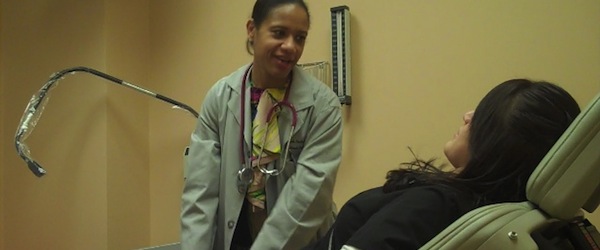
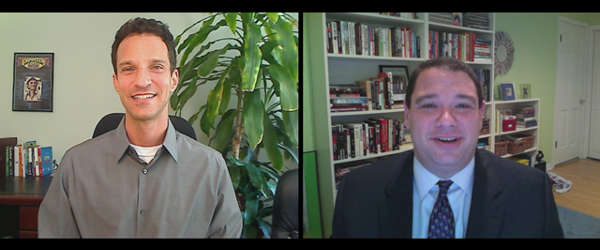
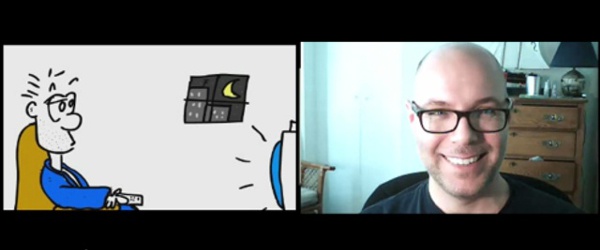
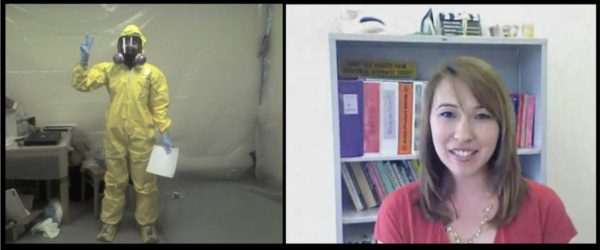
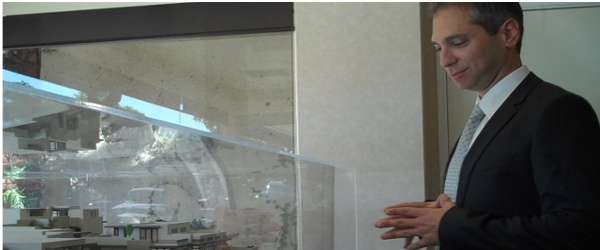
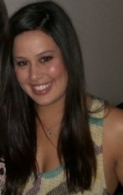
Hey Jessica, thank you for your advices. I was actually working at a Premier family Club back in Atlanta, where we had to do everything from Sunday Branches to Weddings, to New Year’s Eve Party to Debutante balls. BUT, i was a server there, also had to fix the tables, though. I also have a Bachelor’s degree in Media, Culture & Communication.. My question is, do you think I could get into it, with out the internship? Since, I really need to work right now and get paid to pay my school loans. Please let me know more.. my email address is [email protected]
Hi Saira – thanks for the comment. Sorry for the delay in responding. I can speak for Jessica in saying that internships aren’t the only way to break in to event planning careers, just a helpful way. Having worked as a server at events and having helped to set-up events, you definitely have more experience for event planning than someone who has never worked at events at all! You should try to get some interviews for entry level event planning positions and be sure to talk in your cover letter and at the interview about your experience working at events. If someone came to me showing a passion for this line of work AND experience working at events (which shows that you not only have an idea of what’s going on and what’s necessary but I would also know that you’re basing your interest in the path on real experience and not some fantasized idea) PLUS a communications degree for a job that requires understanding communications, I would definitely take the person seriously enough to grant an interview for an entry level position. Sell yourself: sell how you worked at that fancy place in Atlanta; you made their events better by working hard and bringing a high level of professionalism; through real experience you found that the event planning path interests you and how you now want to step into an event planning role to bring that same high level of professionalism to the new employer and make their events amazing. If you’re in Atlanta and not still in New York, see if you can get an entry level position at that fancy club in Atlanta! They already know you and hopefully remember you as someone who did good work. Try to get a great reference letter from them so you have it ready to go in case anyone interviewing you wants to see what a fancy club says about you. Good luck and please keep us posted on what happens.
From: Christiane :-)!
This was so helpful. Thank you Jessica and Mark! I wanted to know when you plan events, on average how many do you focus on? Do you work with one client at a time or many? and how many? I have always been interested in event planning. I think I may have some experience through my college events, setting up chairs for Fashion shows, being a resident assistant, and having an education in International Business. I think I have a shot in this industry. Hopefully, I can find some people to talk to in the new york area.
I also would like to add that I worked in sales for 4 years!
Hi Christiane – Thanks for the feedback! Your years in sales should an asset for event planning careers – those same people skills and communication skills will come in handy. The volume of events you work on really depends on your individual employment situation. It’s likely that it will differ day-to-day. On event days you may mostly be focused on that one event. On other days you may be helping with bits and pieces for a variety of upcoming events. Good luck!
Wow, wonderful article. I have been searching for a website that has actual people in the profession I am looking to get into. I currently work in the mortgage industry but am destined for a more project oriented, creative, collaborative job and I think event planning is it. I have a communications degree and lots of experience in all kinds of roles where my effective public speaking and positive outlook has helped get me ahead. I think the key parts of this interview were the information interviews, I have started this practice already, and interning. I have heard that corporate event planning kind be a bit boring but lucrative and regular hours. I would like to get into more of a creative planning role and feel that will be with more wedding planning roles. However my city of St. Louis is very saturated with wedding planners. Any ideas on what type of event planner area/companies I should target to scratch my creative itch, but still be able to support myself?
Thanks Anlutes! Glad it was helpful. We interviewed Tommy Rosenthal from the mortgage industry in St. Louis, so it’s funny you mention that. Sounds like you’re more excited about event planning. Since the wedding event planning field is saturated out there, you might want to look into opportunities at branding experience agencies like Jack Morton. They might not have offices in St. Louis but look around for companies like that. They’ll plan events to help launch products, build brands for products and re-establish brands. Then the brands themselves often have people overseeing events. Think about a product like Red Bull and how they tie in with extreme sports. Someone has to do event planning for the extreme sports events where the Red Bull brand will be present. Then there are jobs at hotels. I know someone who has worked at fine hotels in Chicago planning events for years. They can range from a company holiday party to a wedding to a conference. Try those angles and see if you can get some meetings set up. Good luck! Thanks for commenting.
hello Jessica and Marc. Thank you for this! Realy helpful. I am in a transition from marketing to event planning and have already intend, did volunteer work, networked and I am applying to the significant industry associations (like mpi) to do some more networking. I scheduled my first informational interview for next week. I would have love to hear more about them on this video. I would appreciate some tips on questions to ask and how to approach the informational interview. Thanks!!
Glad the event planner career video was helpful, Karlam25. Good luck with the informational interviews. Just approach them the way we do here on Careers Out There. It’s a friendly chat where you get to know the person you’re meeting with. Be relaxed and be focused on learning everything you would want to know about the path and what it’s like to work at each place you meet with. You can copy what I ask all of our guests here on Careers Out There and add whatever else you feel you personally want to know about the path and the company. It’s not a job interview – you’re not interviewing for a specific open position – but it is a chance to impress whomever is meeting with you. Show your enthusiasm, make clear what skills you bring to the table, research the person and company you’re meeting with before walking in and ask lots of questions. Bring a notepad with your questions and take notes on the answers. I hope that helps! Thanks for commenting.
Hello my name is Ellen and I will shortly be graduating from High School and I am very interested in this profession and I just had a few questions. Firstly, I was wondering do I need to go to a university or is community college fine to get a career in event planning? Also should I do an internship before, during, or after college? Lastly, since Jessica said the exact major doesn’t necessarily matter it just has to be related what are the majors under event planning?
Hi Ellen – It’s never too soon to grab an internship for an event planner career. Get as much experience as you can. There’s no reason to wait. The more experience you get, the more you’ll know, the more prepared you’ll be for a job, the more people you’ll know, and the more likely you’ll make a good/attractive employee. I don’t think there’s a definite answer to your question regarding college vs community college. It probably depends on who is competing locally for the same jobs. By starting to set up informational meetings like Jessica suggests, you can start learning the backgrounds of who has those jobs in your area and what is expected of new employees. Experience always goes a long way so if you can start getting event planner experience, it will make you more attractive regardless of your degree. As for what to study, a business major can’t hurt because you’ll need to work with budgets. Liberal arts majors and communications majors can’t hurt because you’ll want to have great communications skills. If you can take a mix of those classes (honing your business/money skills and your communications skills) and get real life work experience, you should be in good shape. Good luck! Thanks for commenting.
Hi Jessica and Marc! This was really helpful! I am currently a Psychology student but I have been seriously considering event planning. I love learning about Psych and my college does not offer a hospitality management degree (but I can get a business certificate) so I was unsure what to do but your video helped. Can you offer any more advice?
Thank you so much!
Kali
Hi Kali – thanks for the feedback. Sounds like you may have only watched the short version of the interview. There’s lots more advice in the full interview and the transcript.
Hello, I am Bachelor in Conventions and Event Management and my question is: How to satisfy that special requirement when applying for the Event Manager position and become well experienced as an Event Organizer or the Event Planner if you cannot get a change to work in this industry at all??? I am keeping applying for a jobs but every time I get a reply: Sorry, but you need more experience. It’s a doomed circle and don’t know what to do. I am interested what other people think about this. How to get more experience? Thanks
Marc, this was such an informative video. I really appreciate you actually helping those who have no clue to what they want to do or people who are disatisfied with their job. You make life easier for us. A BIG Thank you from me!
Hey Chris – thanks a lot for taking the time to leave feedback! Much appreciated. I’m glad our content helps you! Best of luck.
Would you recommend obtaining a CMP? If so, which institution offers this?
Hi @cde84ba497e551fea1c8bdd0840cf1d7:disqus – Sorry but I don’t have specific information on the CMP for you. Our guest didn’t have one and others I know in the industry didn’t get a CMP either. I suggest doing some informational interviewing like Jessica talked about in the full video so you can ask a variety of established people in the industry for their opinion on the CMP. Good luck!
Hi Marc, thank you so much. This is such an awesome website for who haven’t known what they want to do in the future. I’m doing a Bachelor in Business Economics and I’m wondering where can I get some sources of knowledge about event planning since I have a goals to work as an event planner after graduating. Could you recommend me some books or website about event planning? Now I’m trying to participate in many events and associations at school to have as much experiences as I can.
Thanks for the message @facebook-100001392463307:disqus! Beyond the full interview with Jessica, I’m afraid I don’t have additional resources for you on how to become an event planner. Jessica suggests in the video that interning for other event planners is one of the best ways to learn about the industry, as is doing informational interviews with event planners. You might want to check out our special video series on how to do informational interviews at https://careersoutthere.com//InformationalInterviewing. Good luck!
I agree with you Jessica. Having your degree will always help you get your foot in the door when others cant. I don’t like the idea of internships however, just don’t think anyone should work for free – it’s not right. If you can get a job working in a small hotel that offers events, you can go anywhere after that. That’s what I did and it worked.
Great videos. Thanks
Thanks for the feedback @KathyinSC:disqus. I’m a huge believer in internships. Working for free taught me a lot and helped me break into the music industry. I look at it like school, except it’s free school. So like Jessica, I too encourage people to do internships. If great paid opportunities are available, then people should do those…but when you have no experience and are trying to learn a new field, it’s a great opportunity to get to learn and test out a path.
Hello I work for a non profit agency that has finally expressed interest in hiring an event coordinator part time. I am considering taking the position but I’m not sure how pay should work. Should I ask for a base pay of around $13hr and a percentage of any funds raised by me. This is something that the big wigs are still discussing but when my executive director has already asked to meet with me to get the ball rolling. Any pointers or suggestions on how I should market myself … HELP
Hi Tommy – sorry for the delayed reply. Non-profits can vary drastically based on their budgets. Some are very small, local, grassroots organizations and others are national organizations. The types of roles they have and pay they offer can really vary. When it comes to running events for a nonprofit, I’m not familiar with anyone paying a commission based on a percentage of funds raised. This may be done somewhere, but not at any non-profits I’ve been involved with. The type of compensation you’re talking about is more common for an event promoter – like you cut a deal with a bar that you’ll fill their room for an event or on a certain night and they’ll give you a cut. That’s a for-profit business…and it’s very common in that type of scenario. I’m sorry that I don’t have more information for you on the right compensation for your non-profit event coordinator opportunity – you might be able to find more info on Salary.com or GlassDoor. Good luck!